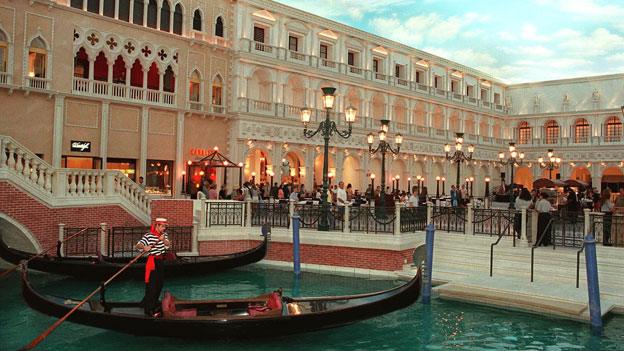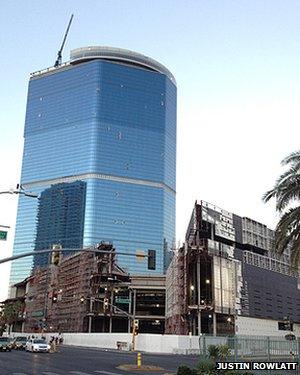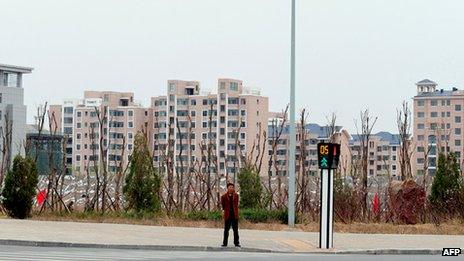Las Vegas casinos trumped by Chinese 'Sin City'
- Published

In the 1970s and 80s, Las Vegas grew at an astonishing speed, but the state of the global economy has seen the famous Strip temper its ambition and look enviously towards its Chinese counterpart.
Las Vegas illustrates just how varied casino design can be - pyramids, medieval castles, circuses - pretty much "anything goes", says Paul Steelman.
But there is one iron rule, he tells me - no mirrors.
Mr Steelman should know. He is a world expert on how to part punters from their cash. His architectural practice specialises in the art of casino construction.
Paul is an impish, irrepressible man. Across a table in his cavernous Las Vegas studios, he tells me how he designed his first casino fresh out of architecture school.
Since then Paul has designed casinos across America and the world.
So why no mirrors? I want to know.
"Because," Paul explains, with a mischievous grin, "casinos are all about illusion".
"You go to a casino to feel like James Bond. The last thing a casino owner wants is for you to catch a glimpse of yourself in the mirror. Then you will see your sagging gut or the pimples on your face and, in an instant, the illusion explodes and you stop playing."
Down on Las Vegas's famous Strip, I discover that the casino industry is - just like that gambler catching himself in the mirror - being forced to face up to its shortcomings.

The Fontainebleau casino complex remains a construction site
It still heaves with people. The volcano at the Mirage still erupts on the hour, the gondolas still drift down the Venetian's counterfeit canals and the Wynn - thanks to Prince Harry - can presumably now put "By Royal Appointment" on its letterhead.
Nevertheless, all is not well in Sin City.
Look up from the parade of party hats and take-away margaritas and you see the garish glamour of the Strip reflected back in the blue glass of the tallest casino complex of them all, the Fontainebleau - or Fountain Blue, as they call it here.
This behemoth was supposed to boast 3,889 hotel rooms, 24 restaurants and - inevitably - a vast casino. But the Fountain Blue never opened.
Its backers went bankrupt having blown $3bn (£2.3bn) on the place. Now the Fountain Blue stands empty, its steel skeleton rusting in the desert wind.
Its construction - and Las Vegas's winning streak - came to an abrupt end with the financial crisis when, after decades of unbroken growth, Sin City became the foreclosure capital of America.
Yet, Paul Steelman has been working hard. That is because, like so many American originals, Las Vegas's top spot in the world market has been taken by a Chinese competitor.
Paul has been busy designing casinos in Macau, the tiny territory in the South China Sea.
Macau eclipsed Vegas in terms of gambling revenues back in 2006. Now the island rakes in an incredible five times the city's total pot, over $30bn (£23bn) a year, compared to the $6bn (£4.5bn) earned in Vegas.
But this year, Macau's growth dipped for the first time since gambling was deregulated a decade ago. A visit to virtually any of China's provincial cities will go some way to explaining why.
I spent three weeks travelling in China's vast hinterland earlier this year and passed through a number of smaller towns and cities.
Almost all were ringed with giant dead-eyed hulks - small-scale versions of Vegas's Fontainebleau, apartment buildings built at huge expense (often with borrowed money) but never occupied.
Nowhere is this more obvious than at Kangbashi in Inner Mongolia - China's ghost city.
There are literally hundreds of empty buildings here, street after street of vacant tower blocks.

Kangbashi was intended to be a city of a milllion inhabitants
The city, designed to house more than a million people, appears to have just one bar and, on the night we visited, we were the only ones drinking.
One Vegas property entrepreneur commented to me that, before the crash, it had seemed that the city's key industry had become growth itself.
He said that by 2006, more than a third of the working population was in construction. Vegas was, he joked, "gambling on growth".
Of course, the bet did not pay out.
We all know what happened next - the magic circle of growth broke and the city's wealth evaporated as property prices collapsed.
As the process played out across America, the world's banks were left with debts that still threaten to bring the entire financial system to its knees.
China has been one of the few bright spots in the world, as its economy has continued to expand.
I walked down the Strip at sunset on my last day in Vegas and looked up once again at the silent shell of the Fountain Blue and I remembered those tens of thousands of empty apartments I had seen in China.
I could not help thinking of Paul Steelman's warning about mirrors in casinos.
How to listen to From Our Own Correspondent:
BBC Radio 4: A 30-minute programme on Saturdays, 11:30 BST.
Second 30-minute programme on Thursdays, 11:00 BST (some weeks only).
Listen online or download the podcast
BBC World Service:
Hear daily 10-minute editions Monday to Friday, repeated through the day, also available to listen online.
Read more or explore the archive, external at the programme website, external.
- Published11 April 2012